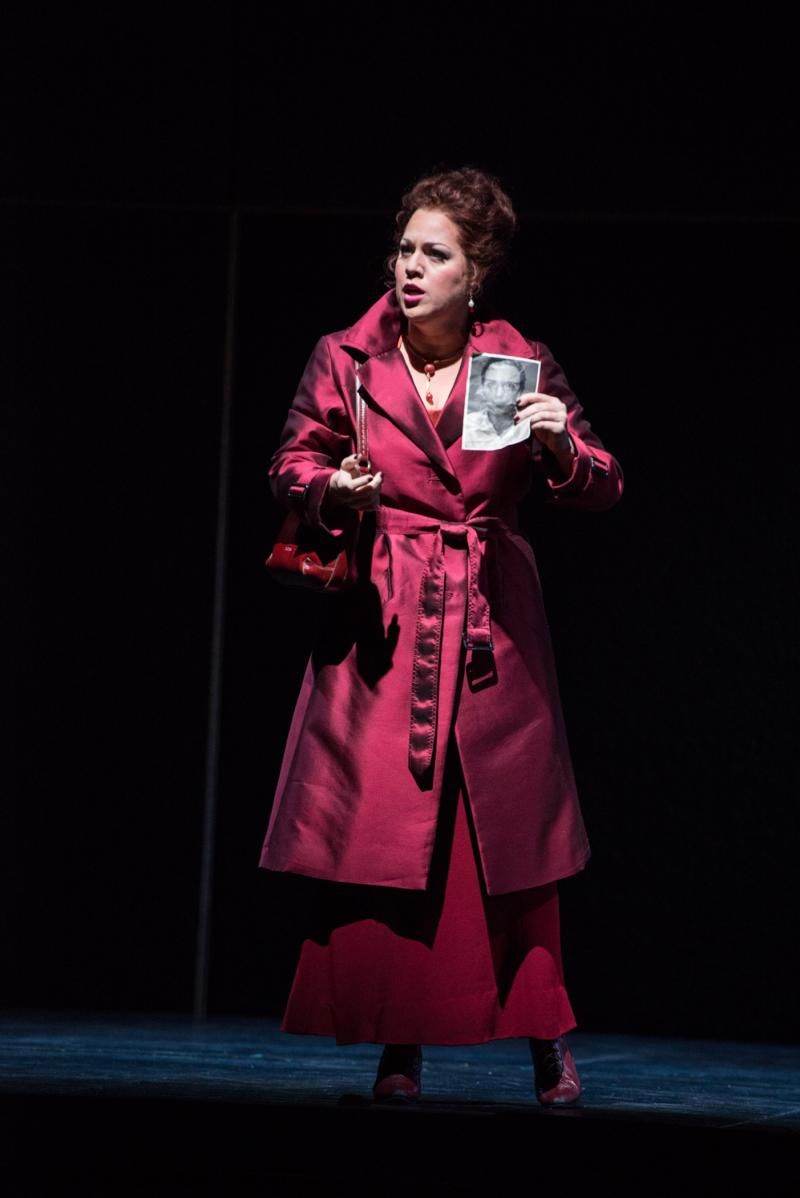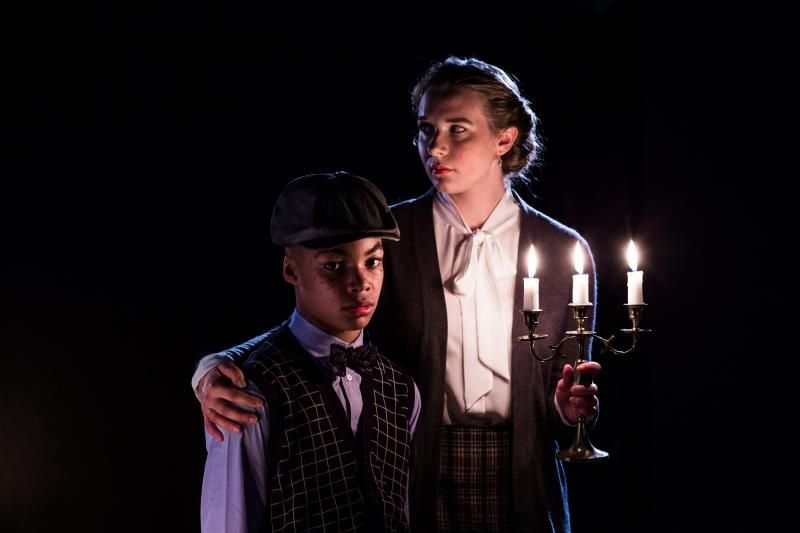Interview: Kazaras Brings Britten's Ghostly Battle to Seattle Stage

From young Harvard opera hopeful (when he and I first met) to New York lawyer to Metropolitan Opera tenor to director of operas on the international stage, Peter Kazaras boasts a background that is unique among opera professionals.
Kazaras, who currently holds the post of Director of Opera UCLA, Professor of Music, brings his expertise, honed over a lifetime of operatic experience, to the Seattle Opera stage as director of their upcoming production of Benjamin Britten's 1954 opera, The Turn of the Screw. The opera's ghostly, supernatural themes, adapted by librettist Myfanwy Piper from a novella by Henry James, seem perfectly suited as a prelude to the Halloween season.
Having fulfilled roles with the company of operatic tenor, teacher, director and head of the Young Artists Program, Kazaras is also familiar with Seattle audiences from his many previous stagings in such operas as Norma (his 2003 SO directing debut), Tristan und Isolde, An American Dream, The Consul and Falstaff. He also sang the key role of Quint in SO's 1993 premiere production of The Turn of the Screw. Company members and audiences alike are excited to welcome him back to direct this psychological thriller.
Erica Miner: You sang the role of Quint here in the Seattle premiere of Turn of the Screw.
Peter Kazaras: It was a very interesting production that had premiered at Glimmerglass-inventive, colorful, with a very strong point of view about the Governess, that she was obviously and seriously disturbed, not just anxious. To me it went down the rabbit hole of what can be a problem with productions of this opera-the issue of, is it all in the Governess's head, are there really ghosts. Henry James, to the end of his life, maintained the ambiguity. I recently found out doing some research that Britten and Myfanwy Piper both wanted to preserve the ambiguity. Some people think Britten, by giving voice to the ghosts, wanted to say of course they're real. I think that actually is not the case. But it's very interesting when people say, "Well, is she crazy or not?" Look around at our world and see how some people absolutely believe things they hear on television that you think are completely insane. Are all those people crazy? Stupid? Misguided? Or do they just believe differently from you? I don't have an answer for that. I think the ambiguity at the core of this opera ultimately makes it a rewarding journey but no one is complacent at the end. If you're able to say, "That woman is just crazy," then that's not a successful production. The former production was fantastically beautiful, very imaginative, but it was obvious from the very beginning that the Governess was out of her mind. I thought as I was doing it that it was not the way I would do it if I ever directed the show.
EM: So maintaining the ambiguity is the key.
PK: Essential.
EM: It's the perennial debate. Are the ghosts real, are they in her mind, is she insane?
PK: When people came up to Henry James at parties and said, "Are the ghosts real?" he would say, "Do you believe in ghosts?" Most people will say no. But if you ask among your friends if they've had any experience with things like that, you will find a startling number of people have, including me.
EM: I admit that I have.
PK: I personally believe in 50 or 100 years people might say, "Oh, yeah, that's just the R37 enzyme that everyone knows still exists in electrical current form for 6 months after somebody dies." We'll know there is something. Some people might call that the soul, the spirit, the ghost. In terms of the show, we also know that James, in writing this, was obsessive in his use of English- correcting small dashes to Em dashes and such-completely wild, and amazing to think about. But he really wanted to make sure everything the Governess says, even though it's a quote from her diary, is open to interpretation.

Photo, Elise Bakketun
EM: Are the children possessed, do they really see the ghosts?
PK: Good question. I don't know. I don't have an answer.
EM: Is it also ambiguous?
PK: Here's the thing. I am lucky that I don't think of myself as an abused child. However, I know some abused children who have grown up into adults. I can assure you they carry the scars of that forever. So is that possession? Trauma? PTSD? Are they all the same thing?
EM: It depends how those scars manifest. If it's in visions of apparitions, that's different.
PK: In the show it's clear that the kids do not see the visions. It's sort of written in the score. But it is clear that the children HEAR the ghosts. What the children are responding to is an inner voice or vibration. A lot of what Quint says is not seen by Miles. Flora does not look at Miss Jessel when she first appears, but the Governess is absolutely convinced that Flora does see her and doesn't say anything. What do you make of that?
EM: Again, it's in the mind of the Governess.
PK: Or not.
EM: There have been so many different interpretations of the novella. Would you construe the story as a psychological study, a supernatural tale, a suspense thriller? None or all of the above? Something else?
PK: To me the death of art is reductivism. Whatever your decision or belief about this story, you are left with the fact that at the end you have one severely damaged child and one dead child. How about 13 kids being held captive in their house in California for 20 years. Whose fault is it? No neighbor saw that there were children who vanished? No one said anything? No one called the police? It took until one of them was old and strong enough to get out and run away, call for help for someone to do something? Is it that the parents were monsters, which is kind of easy to believe, or is it as a society we're all in a sense culpable for lack of involvement and empathy? That's why I say when people ask the question, it's really the wrong questions to ask. Because you ask that in order to get yourself off the hook. They're ghosts, or it's all in the woman's mind, so there's nothing we can do. To which my answer is, there's a dead boy, and a completely messed up girl. What is your responsibility for that? There's a guardian who says, "You have to take care of them. Never write me, don't get in touch with me, I don't have time."
EM: That aspect of the story has never sat well with me.
PK: English parents often send their boys away.
EM: They do but do they specifically say, "Don't ever contact me."?
PK: The decision is, they won't be contacted. Unless the boy dies, or is sent home from school.
EM: But it's implied, yes?
PK: It's not quite as extreme as that. It takes a certain British upper-class thing and magnifies it. It takes a vibration in the chord and makes it dominant. I had some friends who were trying to get their kid into a prestigious Upper Eastside school in New York. The people there said, "Here's the deal. You entrust the girls to us. We will educate them better than anyplace in the country. You drop them off at the beginning of the day, take them home at the end of the day. We don't want to see you. No parent-teacher conferences except as scheduled, no notes about why there's too much homework. We take care of it all." For the people who want that, it's great. Others find it puzzling. It's just another way of saying that in this story you take a normal thing and you give it a little "Turn of the Screw." All of a sudden you're saying, "What is that?" The uncle is not the kids' parent, he's the guardian. For an uncle to say, "Don't contact me" is not weird. What's weird is that he doesn't exactly vet the Governess. We know from the book there were others who applied for the job and turned it down because they thought it was too weird. What is there about her that wanted to do it? She even takes a couple of days to think about it and says yes, I can do this. Utterly weird.
EM: Whatever her reasons, if she doesn't say yes, there's no story. The fact that the uncle divests himself from the kids-is it also a social commentary?
PK: I don't think so. James went to great lengths to say he was just writing a potboiler, faux modesty about it. "Oh, it's nothing much, it's just a sensational bit of fluff." It ended up being a huge success, but I don't think he was making a social commentary. I am interested in the ramifications of what happens when children are hurt.
EM: Psychologically?
PK: Yes. And physically. Children go to the hospital and say, "A bookcase fell on us," as they have been coached to do by their parents.
EM: About your staging both real and ghostly aspects to the story. How do you maintain a balance?
PK: I don't. My Governess, the first time said, "Is this really happening?" I said, "I don't know, what do you think?" I think everything is really happening, but it's in the eye of the beholder that the issue arises. There aren't any straight answers. I don't believe that's what you need for a production of this opera. You need confusion and ambiguity. In this production, we're using the set from the old Don Giovanni, basically a big black wall on which are projected amazing, wonderful images from this genius projection designer Adam Larsen. Sometimes you're going to look at it and think, there's a house onstage...no, a train station...no, a forest...no, that's sky. Because it looks so real. Other times there will be hallucinogenic images which are like something that's going on inside the Governess's head.
EM: That's the beauty of projections. When done brilliantly, you can do anything.
PK: That's right.
EM: What are the particular challenges of working with children in an opera?
PK: In this one, Britten knew what he was doing. He made it so it could be easily encompassed by a boy soprano, especially with some training. We have two boys and a cover, all able to sing the role and very different, which is also interesting. One of ours is the BBC boy's chorister of the year, a real heavy hitter. Equally gifted is the American kid who's doing it. Neither is particularly experienced in stage productions as opposed to being in choruses. Part of the challenge is that most boy sopranos, you have to encourage them to actually go there, especially with this role, which demands that the kid be psychically crushed to death onstage, at the end of his rope, by the end. That's not something a typical 13-year-old feels comfortable sharing in public, right?
EM: I wouldn't think so.

PK: Yesterday one of the kids was trying something, one of the spoken lines, just sounding angelic. I finally had to challenge him. I sat at my desk and pounded, making louder and louder noises. He finally in desperation screamed back at me. I said, "Yes, that's what you need to do." He was like, "Wow." But I'm just doing my job there. We have to find a way in for both of the boys and they're very different-physically, emotionally, and what they bring to the role. That's not different from what you would do in any double-cast situation, if you're doing it right. You actually deal with the people in front of you. Miles himself, a lot of what he does is ambiguous. In the book he's described as being even more angelic than his sister, and physically beautiful. Sweet, smiling. Eventually the way the Governess views that, changes. She starts to find it horrifying, evidence of his collusion with the ghosts, the "Others." Every now and then he'll say something like, you trust no one, but [sings] "You think of us, my dear, and of the Others. Does my uncle think what you think?" And off he goes. The Governess quite rationally says, it was a challenge. But maybe it wasn't. Maybe he was just saying, what do you think is going on here? Miles, in everything he does, is ambiguous, or should be. If he looks like a demon all the time, actually demonically possessed, I think it's a wrong way to go with the show. He's just a kid being a kid and what a 13-year-old might do occasionally might be devilish. I think it's better. That's what we're going for.
EM: What are some of the unique challenges of staging this opera?
PK: The boy, what to do with him. In the production I did here for the Young Artists, we used a countertenor who was maybe 23 but looked 15. That was really interesting. We could really talk frankly about all the things that are going on. With young boys in the room, some of what I say is just private. These boys are not dumb, they're smart and aware of the world. Not that I have to keep secrets, but one watches what one is saying. We also have a 25-cent penalty for bad language.
EM: Seriously?
PK: It's more ignored than observed. It's very funny. You try not to drop a certain "bomb" if there are 13-year-olds in the room. I sometimes make a penalty for saying "I'm sorry." That's what people say most in rehearsals, which is the worst waste of time of anything. Just keep going, I don't care if you make a mistake. This show is emotionally challenging, especially for the Governess. Most Governesses I've worked with have gone through a period of not sleeping well and having a breakdown in rehearsals. That's normal for this piece. You have to learn how to navigate the intense emotional demands. It's constructed into the piece because of what is happening with the music and with the chords, a clash with tonalities. By the final scene, there's an unrelenting passacaglia underneath, and the Governess is singing in A major and Quint in A-flat. It's not difficult to hear, but there's a lot of tension. Working again on this score I feel like, how much of it is about tension leading to release, and not a nice kind of release but getting you into further trouble. At the end, Quint wins, in a way, even though the Governess thinks she's won, the boy's dead. It's not a warm fuzzy feeling at the end of this opera if you're a performer. Does the person who's doing something bad always feel good about it, or does he or she sometimes feel shame? That concept of shame is really interesting for this piece. According to Britten's biographer Humphrey Carpenter there were some unnamed childhood incidents which I think must have caused some issues. This notion of growing with shame and dealing with it in a long-term situation is very important, something that's at the heart of this piece. I've actually tried to bring a bit more of it into the piece than I have in prior incarnations.

Photo, Dario Acosta
EM: The ending leaves the audience with questions. Also the performers.
PK: The performers have been dealing with the questions for months by the time of the performances. all performers are different. Some stay in the mood of what they've done for hours afterward, for others it's easy to drop what's going on. It depends on the performer. It requires an immense amount of concentration. It's a perfectly constructed piece musically. You have to do what's really on the page, not something like it. Not that we don't try to do that in everything, but there's a bit more leeway in some pieces. Not in this.
EM: For me it's emotionally draining, jarring, disarming and disturbing.
PK: It's up to the audience what they want to feel, but after a successful production of this I'd think they should leave the theatre confused, angry, upset. It's not Rosenkavalier or Falstaff or Elixir of Love. How do you leave Wozzeck? Do you think, "Well, that was fun," or do you think, "It's terrible what people do to each other"? We tend to forget that, if we're focusing on ghosts and crazy women, this opera is a tragedy. At the end there are two kids who have been annihilated. That's tragic. Especially if you think they were annihilated with the best conceivable intentions.
EM: What attracts you most about this opera?
PK: It speaks to aspects of the human condition that are among the most difficult questions we have to grapple with. What is responsibility for others, what is caring for others. That's one of the odd lessons about this piece. What happens to the kids is the ultimate answer to, "Is it all in her mind or are they real ghosts." The answer is, it doesn't matter. Look at the children.
EM: Whether or not the ghosts are real, the end result is tragedy.
PK: Right. I love working on The Turn of the Screw, it's one of my favorite pieces.
EM: And I can't wait to see what you've done with it.
PK: Thank you for taking the time to do this, Erica. I appreciate your interest.
EM: Thank you, Peter, for taking the time. I'm looking forward to Oct. 13!
Seattle Opera's The Turn of the Screw runs from Oct. 13-27 (https://www.seattleopera.org/on-stage/turn-of-the-screw/).
Photo credits: courtesy of the Artist, Elise Bakketun, Dario Acosta, Philip Newton
Videos

